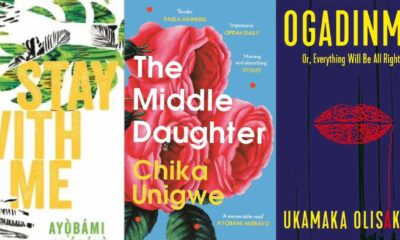Features
John Adebimitan: Want to Read More Books This Year? Here’s How to Start!
You’ll be more efficient by focusing on one book at a time rather than trying to juggle multiple styles, vocabularies, and subjects.
 Reading books is good for you. Like vitamins. But don’t swallow them, because they’re, you know… books.
Reading books is good for you. Like vitamins. But don’t swallow them, because they’re, you know… books.
Reading is a balm and helps you stretch your mind – pushing your brain to work in new alignments and exposing you to new ideas. Like vitamins, books should be consumed regularly. But for all its goodness, reading books is nowhere near as easy as taking a pill. Finishing a book a day is (almost) impossible, unless you are an English Literature major in college with no other responsibilities than reading.
These days, it’s hard to find time to read a book. Jobs, family, friends, the countless errands that arise day-to-day, eating, leisure time, sleep – all of these things take time, and so does reading books. But that’s not enough reason not to read, or to start reading more.
There are ways to read faster and more efficiently that make books an easier undertaking. Whether you are reading technical books on programming languages or an escapist fantasy novel, here are 10 ways to read more of what you want and what you love:
Set aside more time
Unfortunately, there’s no way around this tip and it’s the truly crucial one on this list. Reading takes time and that won’t change – no matter how many shortcuts you take to shorten it. One way to make this easier is to set aside a consistent time for reading every day. It could be the first thing you do when you wake up or the last thing you do before you go to bed.
Create a list of the books you want to read
Maybe you want to be the person wandering around a bookstore for hours, and maybe you don’t. Either way, a list will shorten your time between books as well as increase your reading speed because you’ll be reading something you’re genuinely interested in, not just something that looked intriguing on the shelf. Using a service like Evernote or Wunderlist makes this list easily manageable on your computer or phone.
Read one book at a time
Ignore who tells you otherwise. When reading an author’s work for the first time, it takes effort and time to adjust to their style. You’ll be more efficient by focusing on one book at a time rather than trying to juggle multiple styles, vocabularies, and subjects.
Avoid sub-vocalization
Sub-vocalization is the process of pronouncing words and speaking them in your head as you read. This process takes time and slows down your reading speed. While sub-vocalization is crucial for the enjoyment of poetry and, let’s say, James Joyce‘s books, most books don’t benefit from sub-vocalization because most books aren’t written by master wordsmiths. Train yourself to read for comprehension and not for the sounds of the words themselves.
Bring a book with you wherever you go
Rather than playing a game on your smartphone, read a book when you’re in a waiting room, on public transportation, in the bathroom, or any other place you find a few minutes. These spare moments add up and will increase the number of books you can read without having to adjust your schedule.
Try speed reading
The bibliophile in me doesn’t want to admit it, but speed reading does work – to a degree. Skimming can help you get through books faster, but it also comes at the cost of a decrease in information retention. Depending on the book, that can be okay or can be a problem.
You can try experimental methods like Spritz, which flashes one word at a time in the same physical location. Some readers, such as Tim Ferriss, recommend using your peripheral vision to pick up words on the sides of the page instead of reading them directly. These options may work for you and even if they don’t, the practice of speed-reading will make you a faster reader in general.
Use a physical tracker
You remember when, as a kid, you used to follow the words with your finger or a pen? Turns out that actually helps. Tracking your progress with a physical marker will keep you from losing your place and help you read faster by keeping your eyes focused on the point your finger moves across. This is also a good method for increasing your reading speed. By moving your finger faster across the page, you are forced to read faster at a consistent rate.
Listen to Audiobooks
Okay, I’m using the term ‘reading books’ loosely here, but hey, listening to books isn’t that different from reading them. If you’re driving in a car, listen to an audiobook rather than the radio. Audiobooks average around 10-12 hours of listening time, so anyone who commutes to work or spends any substantial time driving will find that audiobooks greatly increase the number of books they consume a year.
Set daily goals
If you are trying to significantly increase the number of books you read, rather than trying to set the long term goal of x number of books per year, focus on the short term goal of x number of pages per day. It makes reading books more manageable and you’ll get a sense of satisfaction from meeting your goal every day.
Get an E-reader
While entry-cost can be a slight inhibitor, if you’re trying to read 50+ books a year, you’ll end up saving money with an e-reader. E-Books generally run several dollars cheaper than paperbacks, let alone the savings from purchasing hardback books. With the added convenience of its portability, you’ll find yourself bringing it with you more often, which, in turn, will increase the amount of time you read.
Like all things, reading gets easier the more you do it.
Within a few books, you’ll find your reading speed increasing and your vocabulary expanding. Reading books is one of the best and most affordable ways to learn a new skill, what it means to be human, and even discover who you are.
To quote Oscar Wilde, “it is what you read when you don’t have to that determines what you will be when you can’t help it.”





















